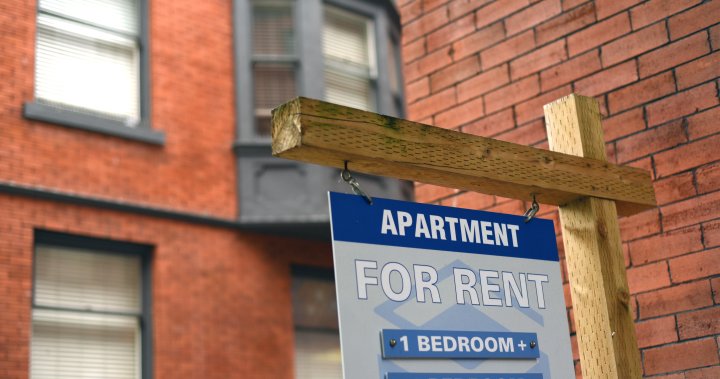
Pressure from higher interest rates and a lack of affordable housing means renters living on minimum wage in almost every neighbourhood across Canada are falling behind, a new report shows.
A Canadian Centre for Policy Alternatives (CCPA) analysis released Tuesday evaluates housing markets in Canada by “rental wage” — the hourly earnings a full-time worker would need to afford the rent on a one- or two-bedroom home at no more than 30 per cent of their income.
The CCPA report finds that the rental wage needed to live comfortably in each province in Canada is well above the minimum wage in those jurisdictions.
The rental wage needed to afford a one-bedroom apartment in Ontario is $25.96 an hour, rising to $29.90 for a two-bed unit; the province’s minimum wage is $15.50, one of the highest in the country.
Results are similar in B.C. and Alberta, while Quebec and Newfoundland and Labrador have the smallest gaps between the rental and minimum wages. The northern territories were not included in the analysis.

On a more granular level, 93 per cent of neighbourhoods with enough reliable data to be included in the study did not have minimum wages that matched the market’s rental wage, according to CCPA.
Perhaps unsurprisingly, Toronto and Vancouver are particularly unaffordable for minimum wage workers. The rental wage in these cities is more than double that of the minimum wage, meaning two full-time workers couldn’t afford the average one-bedroom apartment together in the cities.
David Macdonald, CCPA senior economist and one of the report’s authors, says that for single parents working for minimum wage in some of Canada’s most expensive housing markets, the rental wage for two-bedroom apartments is far out of reach, leaving entire families constrained to single-bed homes.
In these cases, he says households stretched thin by unaffordable rents will either put more of their income to these monthly payments and try to cut back on other expenses or be forced to move out of the city to more affordable neighbourhoods far removed from the downtown core — or out of the city entirely.
“It used to be, in some cities, you could find pockets where rents are more affordable,” Macdonald tells Global News.
“It’s just a huge discrepancy and incredibly difficult for people making the minimum wage to actually afford basic rental housing in this country.”
Interest rates intensifying supply and demand imbalance
The CCPA analysis is based on the average rents and wages from October 2022. Since that time, rents in many Canadian cities have surged amid rising interest rates from the Bank of Canada.
Rents have gone up “substantially” in most major Canadian cities over the past year, bringing the market to “crisis levels,” explains Mike Moffatt, an economist and founding director for the PLACE Centre, a sustainable community initiative from the Smart Prosperity Institute.
He explains that while higher interest rates translate directly to higher mortgage payments for new and existing homeowners, they also put pressure on landlords’ monthly cash flows and make it more difficult for renters to move into the ownership market — both of which put more demand into an already tight rental market.
While average hourly wages have been on the rise for much of 2023, outpacing inflation for the first five months of the year, momentum here has been waning in recent months as higher interest rates take hold and slow the economy.
The Bank of Canada paused its interest rate hiking cycle earlier in 2023 but recently resumed with two more quarter-point increases to its policy rate in June and July.

Higher interest rates also make business cases more difficult for new residential construction, Moffatt points out, which only further compounds the pain on renters.
“You get this squeezing effect where demand goes up when interest rates are high, but housing supply goes down and that only further causes rents to spike,” he says.
This pressure should be met with more government support, Moffatt argues, to allow struggling renters to hold onto their homes.
In this vein, B.C. introduced a $400 tax credit aimed at low- and middle-income renters in its 2023 budget and the federal government added a one-time top-up to the Canada Housing Benefit for low-income households starting in December.
Moffatt believes that some of the solutions should be targeted in areas where demand is bubbling up the most. He points to Canada’s university and college campuses, where international students coming to study have ratcheted up pressure on their respective cities’ rental markets, as sites where more residences could be built to relieve some pressure.
The CCPA report is an argument for raising the minimum wage in many parts of the country, Macdonald says, but he says hiking pay rates so they’re in line with the rental wage is unrealistic in the most expensive markets.
The issue of rising rent affordability is not just a matter of wages, but of how the rental market in Canada is structured, he argues.
“Part of the story is about wages. But a big part of the story is about rents and whether we have been building enough purpose built rental, affordable rental for folks to live and work in big cities,” he says.
Government can take a more active role
Both Moffatt and Macdonald pointed to the 1970s and ’80s as providing a framework for how the governments can step up to get more affordable housing built.
In Ontario, for instance, the property taxes on purpose-built rental apartments are twice those of single-detached residences.

That makes no sense to Moffatt, who notes higher tax rates are meant to discourage unwanted actions from the private sector, but governments are in desperate need of new purpose-built rentals. He says that 40 years ago there were a series of federal tax incentives that helped developers break ground on new apartments that he’d like to see brought back.
“A lot of the bottlenecks to building purpose-built rentals is just viability, that they’re very expensive to build,” Moffatt says. “Part of the reason they’re expensive to build is a cost coming from government.” He points to high development charges as another concern for getting units built.
Relying on the private market to build affordable housing will not succeed in the face of higher interest rates, Macdonald argues, adding builders who have to wait for favourable market conditions to put shovels in the ground won’t solve the rental affordability crisis for Canadians.
Higher interest rates are “what’s driving the train right now,” he says.
“And the train is towards substantially less residential investment. This is why we need government intervention here.”
When interest rates eventually fall — some big bank economists are targeting the second quarter of 2024 for rate cuts — both Moffatt and Macdonald believe some of the pressure on renters is likely to ebb.
But Macdonald notes that a drop in interest rates won’t necessarily translate to lower rents.
“These higher prices are locked in now for some time,” he says.
“The long-term picture is that we just haven’t been building affordable rental housing at all. And that picture isn’t changing irrespective of what’s going to happen on the interest rate file.”

















